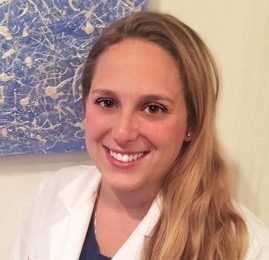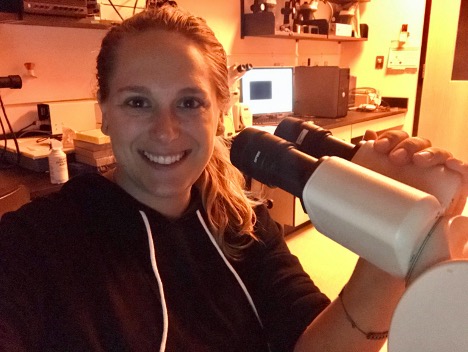This post is part of a series where Rutgers grant and/or fellowship winners are invited to share their thoughts and experiences with the process of applying for funding in graduate school.
By Anna O. Giarratana, PhD

Hi there! I am Anna and I am a physician-scientist in training in the Rutgers Robert Wood Johnson Medical School and Princeton University MD/Ph.D. program. I completed my Ph.D. in Neuroscience in the lab of Dr. Janet Alder. One of the great benefits of attending Rutgers University stems from its 2013 merger with the University of Medicine and Dentistry of New Jersey (UMDNJ). Due to this merger, Rutgers is now a university where there is cutting edge basic science research being done, as well as strong connections with one of New Jersey’s highest-rated hospital systems. This, along with the fact that Rutgers has recently been awarded a $29 million grant from the NIH Clinical and Translational Science Awards Program to form the New Jersey Alliance for Clinical and Translational Science program means that it is an environment where physician-scientists and their research can really thrive. It is for this reason that I chose to do my training at Rutgers, studying the genetic risk factors for poor recovery after repeated mild traumatic brain injuries and working to develop precision medicine treatment approaches.
My experiences with the world of funding
To fund my PhD research, I worked closely with my mentor to apply for both a National Institutes of Health (NIH) F30 grant and a New Jersey Commission on Brain Injury Research (NJCMIR) pre-doctoral grant. I was fortunate enough to receive the NJCBIR grant, which funded my time doing my PhD research on traumatic brain injury. In my PhD work, I worked in a mouse model system to study if/how certain genes are risk factors for impaired learning and memory, motor function, and immunohistochemical markers after multiple concussions.
In the last year of the PhD, I applied for a Fulbright/Swiss Government Excellence grant to fund a post-doctoral research year in Switzerland. Thanks to this grant, I have been able to pivot in my research interests, and to explore decision making in humans at the Zurich Center for Neuroeconomics.
I am so grateful for all of the funding I have received for my predoctoral and postdoctoral work. This funding has given me the freedom to pursue my research interests, wherever they may take me. The Fulbright grant offered me the ability to move to Switzerland to join the lab of Dr. Philippe Tobler at the University of Zurich, a group that is on the forefront of studying the role of dopamine in human decision-making. This opportunity has allowed me to expand my knowledge base and develop expertise in new research methods that I will be able to carry forward in my future research.
My Fulbright postdoctoral research project
There is often a disconnect between what happens at the basic science research bench and the clinical patient bedside. As a physician-scientist in training, I am passionate about using interdisciplinary methods to solve clinical problems, with the aim of using emerging technology to better understand the disease process and to develop better diagnostics and therapeutics. For that reason, I chose to join the Tobler lab group to start my postdoctoral research journey. In clinical neuroscience, it is often not well understood how the underlying neural pathology affects cognitive abilities, such as decision-making.

In my current project, I am studying the effect that schizotypal personality traits have on the ability of people to adapt in visual and reward decision making tasks. Our lab will then use functional magnetic resonance imaging, commonly referred to as fMRI, to distinguish which areas of the brain are responsible for any deficits that are seen.
This work has the potential to uncover many novel findings of the schizophrenia spectrum. If we find an impaired ability to adapt to our tasks in individuals with high levels of schizotypal personality traits, this would be an important finding to build on. Future studies would be able to investigate whether this trait is predictive for the development of schizophrenia and if behavioral interventions can improve performance and prevent progression from schizotypal personality traits to schizophrenia. The findings from this study have the potential to be far-reaching and will increase our understanding of the schizophrenia spectrum on a behavioral and brain activity level.
After I complete my postdoctoral research project at the University of Zurich, I will return to Rutgers Robert Wood Johnson Medical School for the last two years of medical school. Following graduation from medical school, I hope to join a research track residency program where I can continue to study cognitive abilities, such as decision making, in clinical populations.
GradFund’s role during my application process
I have worked with GradFund a number of times throughout my years at Rutgers. When I started my Ph.D., I met with GradFund to identify grants that I could apply for to fund my Ph.D. research. When I was finishing up my Ph.D., I joined the GradFund Summer 2018 Mentoring Program to work on my Fulbright application.
The GradFund Summer 2018 Mentoring Program was a really important part of my process of applying for the Fulbright grant. Before the summer program started, I had done all the necessary scientific prep work; I had identified a lab to go to, I had engaged in discussions with the mentor, and we had come up with a project for me to work on that merged my current expertise with the future directions I wanted to take my research in. The one (important) thing I hadn’t done yet was put the pen to paper to explain to Fulbright why this grant was the one I wanted to pursue, and why I would make a great Fulbrighter. During the GradFund Summer Mentoring Program, I worked with not only the program director, Teresa Delcorso-Ellmann, but also my peers in vastly different fields from myself, ranging from archeology to linguistics. It was this program that took my application from a dry and logical plan of scientific research and breathed life into it, helping me to explain why my project was important to the world and show how I would embrace what it meant to be a Fulbrighter.
My advice for other applicants
For students who are applying to fellowships and grants, I think it’s important to constantly be on the lookout for any relevant grants and fellowships and identify grants that you’ll want to apply for in the future. For example, I found out about the possibility of applying for a Fulbright grant to fund postdoctoral work in May 2016 through a departmental email. I researched it a bit and tucked it away as an option for me, even though I was only a year into my Ph.D. I spent the time in between doing my Ph.D. research, taking coursework in neuroscience, staying up to date by reading journals, and identifying labs I might want to work do postdoctoral work in. By the time I was ready to apply to the Fulbright two years later, I was certain that it was the direction I wanted to take and had prepared myself to have a competitive application.

